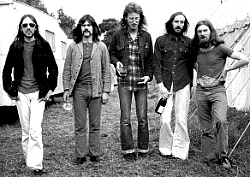|
lemonade kid
Old Love
    
USA
9876 Posts |
 Posted - 02/01/2014 : 16:53:36 Posted - 02/01/2014 : 16:53:36


|
Fondly known as the 70's Beatles...for a while they were huge in the UK (though mostly unheard of here in the States)
They have recently reformed and started gigging in the UK in December 2013...
Run For Home 1971
http://www.youtube.com/watch?v=HLwTuOextNI
LINDISFARNE

Lindisfarne are a British folk rock and progressive rock band from Newcastle upon Tyne established in 1970 (originally called Brethren) originally fronted by singer/main songwriter Alan Hull and Ray Jackson. The original line-up comprised Alan Hull (vocals, guitar, piano), Ray Jackson (vocals, mandolin, harmonica), Simon Cowe (guitar, mandolin, banjo, keyboards), Rod Clements (bass guitar, violin) and Ray Laidlaw (drums).
They are best known for the albums Nicely Out of Tune (1970), Fog on the Tyne (1971), which became the biggest selling UK album in 1972, Dingly Dell (1972) and Back and Fourth (1978), also for the success of songs such as "Meet Me on the Corner", "Lady Eleanor", "Run For Home" and "We Can Swing Together".
Meet Me On The Corner
http://www.youtube.com/watch?v=MYPBF4s8m_Y

The group began as 'The Downtown Faction', led by Rod Clements, but soon changed their name to Brethren. In 1968, they were joined by Alan Hull and became Lindisfarne after the island of that name off the coast of Northumberland. In 1970 Tony Stratton-Smith signed them to Charisma Records and their debut album Nicely Out of Tune was released that year. This album defined their mixture of bright harmony and up tempo folk rock. Neither single released from the album, "Clear White Light" nor "Lady Eleanor", charted; nor did the album itself at first. However the band obtained a strong following from its popular live concerts and built up a following as one of the top festival bands.
Their second album Fog on the Tyne (1971), produced by Bob Johnston, began their commercial success. This album reached No. 1 in the UK charts the following year. The extracted single "Meet Me on the Corner", composed by Clements and sung by Jackson, reached No.5 in the UK and remains the only Lindisfarne song to win an Ivor Novello award; its performance on BBC TV's Top of the Pops featured Laidlaw striking a large bass drum with a rubber fish. The song was subsequently covered by US urban country singer Henry Gross and, much later, by British actor Kevin Kennedy on an album released in New Zealand and by Paul Weller at an all-star concert in aid of the Teenage Cancer Trust; the latter rendition was issued on DVD. The song's distinctive rhythm has also been cited as an influence on the Queen song "'39".
"Lady Eleanor" was reissued as the follow-up, and reached No.3 in the UK and No.82 in the US. The debut album Nicely Out of Tune belatedly made the UK album chart Top 10 and the band began to attract a huge media following, with some calling Hull the greatest songwriter since Bob Dylan. The band were even referred to as the "1970s Beatles".
in 1972 they recorded their third album, Dingly Dell. The band were unhappy with the initial production and remixed it themselves. It was released in September 1972. Though it entered the Top 10 in the first week of release, it received lukewarm reviews. The ecologically themed single "All Fall Down" was a UK Singles Chart No. 34 hit but the second single "Court in the Act" failed completely.
Internal tensions surfaced during a disappointing tour of Australia in early 1973. Hull initially considered leaving the band, but was persuaded to reconsider. It was agreed that he and Jackson would keep the group name while Cowe, Clements and Laidlaw left to form their own outfit Jack The Lad. They were replaced by Tommy Duffy (bass guitar), Kenny Craddock (keyboards), Charlie Harcourt (guitar) and Paul Nichols (drums). The new line-up lacked the appeal of the original and with Hull also pursuing a solo career, the band's next two albums Roll on Ruby and Happy Daze and the subsequent singles failed to chart. They disbanded in 1975. Nichols subsequently joined the hard rock supergroup Widowmaker, and in 1991 made a surprise appearance on the ITV game show The $64,000 Question as a contestant.
The original line-up of Alan Hull, Ray Jackson, Ray Laidlaw, Rod Clements and Si Cowe reformed in 1976 to perform a one-off gig in Newcastle City Hall before returning to their other projects. The Newcastle City Hall reunion was so acclaimed that the band repeated it a year later and decided to get back together on a permanent basis in early 1978. They continued to perform at Newcastle City Hall every Christmas for many years performing a total of 132 shows at the venue overall. They gained a new record deal with Mercury returned to the charts in 1978 with the UK chart top 10 hit "Run For Home", an autobiographical song about the rigours of touring and relief at returning home. The song also gave them a hit in various countries including their first top 40 US singles chart hit (No.33) on Atco Records and the album Back and Fourth moved into the UK album chart top 30. Subsequent singles "Juke Box Gypsy", "Brand New Day" and "Warm Feeling" failed to sustain their newfound success. The next album The News (1979) failed to impress and the band lost their record deal.[4] In 1980 they supported The Beach Boys at the Knebworth Festival.
Over the following decade, the original quintet continued to release albums. They formed their own company Lindisfarne Musical Productions and recorded singles such as the electric, rock-oriented "Friday Girl" and the humorous song "I Must Stop Going To Parties" in the early 1980s, as well as the album Sleepless Nights. In 1984 they supported Bob Dylan and Santana at St James' Park. Saxophonist, flautist and vocalist Marty Craggs joined shortly afterwards, making the band a sextet. During the second half of the 1980s they played annual Christmas tours and released Dance Your Life Away (1986) and C'mon Everybody (1987) – the latter made up of covers of old rock and roll standards and reworkings of some of the band's most popular songs. Keyboardist Steve Daggett, formerly of new wave band Stiletto, produced both these albums and augmented the onstage line-up for two tours.
Another album, Amigos, was released in 1989. In 1990 Lindisfarne introduced themselves to a younger generation with the duet "Fog on the Tyne Revisited" accompanied by footballer Paul Gascoigne, which reached No. 2 in the UK singles chart. Soon afterwards Jackson left the band, with Craggs taking over his lead vocals and harmonica and eschewing saxophone in favour of piano accordion and tin whistle, as the band gradually rediscovered its acoustic roots. Clements moved to slide guitar and mandolin, his former role as bassist being filled by Steve Cunningham and later Ian Thomson. Hull's son-in-law Dave Hull-Denholm joined in 1994 to replace Cowe, who left shortly after the recording of the album Elvis Lives on the Moon and emigrated to Toronto, Canada, where he currently runs a brewery. Alan Hull died on 17 November 1995, but the surviving members continued to use the name.[4]
With former Jack The Lad frontman Billy Mitchell in Hull's place, the band released two more studio albums, Here Comes The Neighbourhood (1997) and Promenade (2002). A number of live albums were also released. Craggs quit in 2000, after which Mitchell took over Jackson's and Craggs' lead vocals and used the harmonica on a harness.
Lindisfarne finally broke up in late 2003, performing a final concert on 1 November 2003 at the Newcastle Opera House. The final line up as a band consisted of Dave Hull-Denholm, Billy Mitchell, Rod Clements, Ian Thomson and Ray Laidlaw.[5] Three members continued to tour under the name Lindisfarne Acoustic until May 2004.
On 19 November 2005 the friends and colleagues of Alan Hull held a memorial concert at Newcastle City Hall in honour of Hull and included musicians such as Alan Clark, Simon Cowe, Marty Craggs, Steve Cunningham, Steve Daggett, Tommy Duffy, Mike Elliot, Frankie Gibbon, Charlie Harcourt, Brendan Healy, Tim Healy, Ray Jackson, Ray Laidlaw, Finn McArdle, Ian McCallum, Billy Mitchell, Terry Morgan, The Motorettes, Jimmy Nail, Paul Nichols, Tom Pickard, Prelude, Bob Smeaton, Paul Smith and Kathryn Tickell. Proceeds from the concert were donated to The North East Young Musicians Fund.[6] The Alan Hull Award for young musicians in the North East was set up a year later in response to the success of the concert.
On 19 July 2012, following a public campaign led by Lindisfarne's former manager from the 1970s, Barry McKay, an Alan Hull memorial plaque was unveiled on the front of Newcastle City Hall, at a ceremony attended by hundreds of fans and filmed by Sky TV and Tyne Tees Television.
In February 2013, in support of Newcastle City Hall which was then under threat of closure, Ray Jackson announced he would return to the iconic venue for a Christmas show for the first time in 23 years. Tickets for Ray Jackson's Lindisfarne Christmas Show sold out in 6 hours. A second show was added for 22 December 2013, which also sold out.
http://www.express.co.uk/news/showbiz/375841/Ray-Jackson-will-bring-back-Lindisfarne-shows-to-Newcastle
In June 2013 Ray Jackson announced that LINDISFARNE were back when he unveiled the line-up of what is Ray Jackson's Lindisfarne Mk 3 comprising 5 former members of Lindisfarne and Roxy Music's drummer, Paul Thompson, all of whom hail from the Newcastle area.
http://www.classicrockmagazine.com/news/ray-jackson-launches-new-lindisfarne/
Ray Jackson whose unique mandolin, harmonica and vocal styles helped create the original sound of Lindisfarne in the 1970s has announced that the first dates with his new LINDISFARNE will take place in December 2013. The new LINDISFARNE band are: Ray Jackson – LINDISFARNE founder member... mandolin/harmonica/lead vocals; Dave Hull-Denholm from the 1990s LINDISFARNE line-up... guitars/lead vocals; Paul Thompson from Roxy Music... drums; Ian Thomson from the 1990s LINDISFARNE line-up... bass guitar/double bass/vocals; Charlie Harcourt from LINDISFARNE Mk 2... guitars/vocals; Steve Daggett toured and recorded with the (reformed in 1978) original line-up... guitars/keyboards/vocals.
Discography
Nicely Out of Tune (1970)
Fog on the Tyne (1971)
Dingly Dell (1972)
Roll On, Ruby (1973)
Happy Daze (1974)
Back and Fourth (1978)
The News (1979)
Sleepless Nights (1982)
Dance Your Life Away (1986)
Amigos (1989
Elvis Lives on the Moon (1993)
Blues From The Bothy (1997)
Here Comes the Neighbourhood'(1998)
Promenade (2002)
Winter Song--a wonderful tune
http://www.youtube.com/watch?v=Yg_dsk7u26A

________________________________________________
Old hippies never die, they just ramble on.
-lk |
Edited by - lemonade kid on 02/01/2014 18:17:25 |
|


